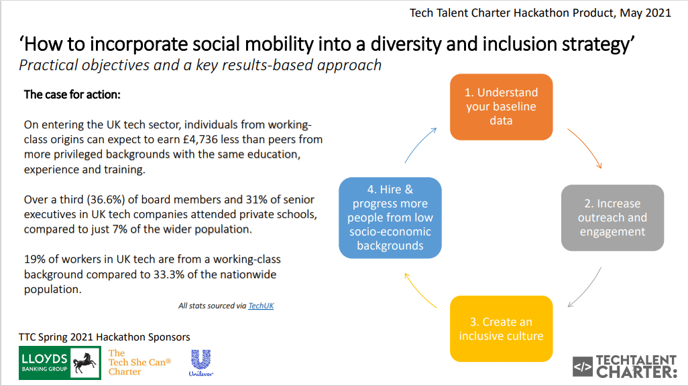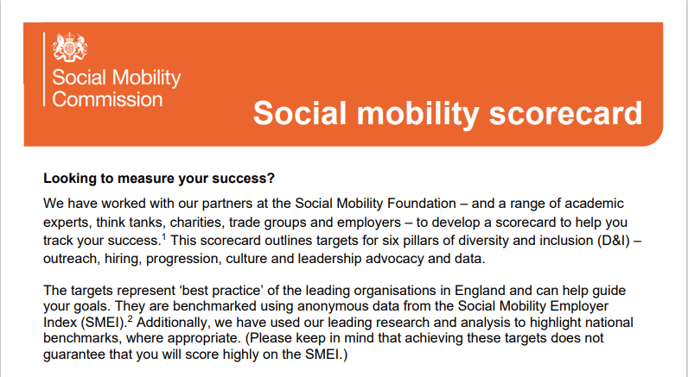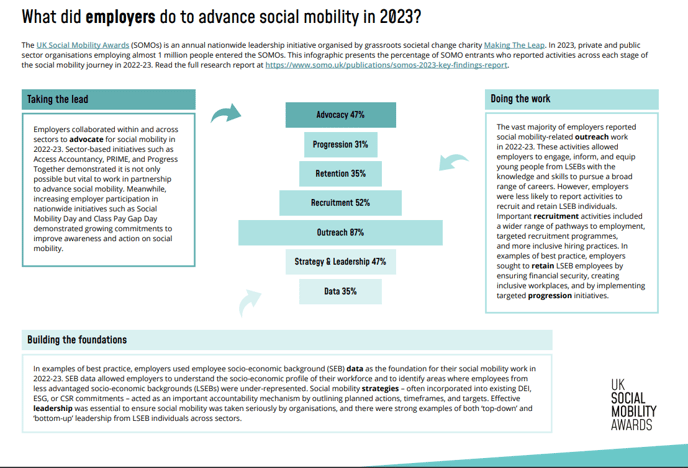'Social mobility is the link between a person’s occupation or income and the occupation or income of their parents. In other words, it’s about ensuring your background doesn’t determine your future', Social Mobility Commission.
In Tech Talent Charter's Diversity in Tech report, the average proportion of ethnic minority tech employees was 6% higher at companies with interventions for social mobility. Read the dedicated section on social mobility in our Diversity in Tech report.
Employer recommendations
➖Begin with data.
Track the social mobility of your existing and future workforce. Consistent collection and analysis of data enables organisations to understand their current situation, and indicates opportunities for action and measure change. Regardless of where your organisation is at on the journey, if you only collect one metric, ask about parental occupation. It gives the simplest insight and is the most accessible information for employee disclosure. Q: What was the occupation of your main household earner when you were aged about 14?
- Watch Tech Talent Charter's 'Share and Learn' video about how to measure social mobility with Sarah Atkinson, CEO of the Social Mobility Foundation.
- Use Sutton’s Trust social mobility guide or the Social Mobility Commission’s Toolkit to set up the collection of data aligned to best practice.
- Provide a variety of mechanisms to encourage and enable employees to disclose data year-round. Make responses to surveys compulsory for employees (always with the option to
“prefer not to say”). Share response rates internally and brief senior managers on progress
and targets in their areas.
➖Create a culture that welcomes and supports colleagues from less-privileged backgrounds:
- Provide support to new joiners once they get the position rather than expect them to 'slot in' without support. Sutton’s Trust social mobility guide says 'Employees from lower socio-economic backgrounds can sometimes feel they need to change themselves to fit into professional workplaces, for example by changing their accents, or avoiding certain conversation topics while pretending to be interested in others. While some form of adaptation is part of any job for employees of any background, this process of attempting to ‘fit’ can negatively impact on employees, resulting in lower engagement in work, which in turn may impact on progression. There is also evidence that people from lower socio-economic backgrounds face micro-aggressions at work, small comments which cumulatively can have substantial impacts on wellbeing, which are likely to contribute to this feeling of a lack of fit.
- Foster a welcoming culture, where all employees feel comfortable and valued. This should include encouraging staff from lower socio-economic backgrounds to tell senior management about any behaviour which has made them feel uncomfortable at work, which senior leaders must act upon. For more advice on building an inclusive culture to promote socio-economic diversity, see the Social Mobility Commission’s Employer’s Toolkit.
- Showcase diverse role models as ‘you can’t be what you can’t see’. Show the characteristics of those who progress in the organisation. Role models are vital - having people in your company who actually understand that background.
- Normalise the social mobility conversation. Encourage employees and leaders to publicly share their own social mobility stories and their experiences in the workplace in town halls, Q&A sessions, intranet forums and live events. Spotlight employees who are demonstrating allyship. This not only supports people from lower socio-economic backgrounds but helps to educate those that do not have those backgrounds so that they understand barriers people are facing or have faced in the work environment so that people operate in a different way in the future.
- Leverage the power of employee resource groups. Organisations like KPMG have a Social Mobility Employee Network which provides people with shared experiences and enables them to communicate easily with each other and find mutual support. KPMG says it 'empowers colleagues from less-privileged backgrounds to achieve their development goals and helps to build a stronger culture within the firm. There are currently over 500 members in the UK firm'.
➖Create a shared narrative about why socio-economic diversity is important to your organisation with clear and visible commitment at senior levels. Include elements of this narrative in regular internal communications alongside other DEI areas to emphasise intersectionality and equal importance.
➖Engage with your supply chain in advancing socio-economic diversity, with contractual obligations where appropriate (e.g. about unpaid internships and data collection).
➖Adopt inclusive hiring practices:
- Emphasise competence rather than qualifications. Asking for a qualification should only be standard if it is essential to the role.
- Recruit for skills and potential over polish.
- Try to differentiate between important soft skills (e.g. communication) and arbitrary factors such as accent or cultural affinity.
- Publish definitions of competences sought.
- Support applicants through the process to understand any other challenges they may be facing (such as what to wear for an interview).
- Create inclusive online environments that give applicants detail on application processes and hiring approaches to support diversity and inclusion.
- Track the conversion rate of Russell Group and non-Russell Group applicants to acceptances to ensure that the balance is maintained throughout the recruitment process, and that it is translating into a more diverse recruitment pool.
- Cover the costs of travel for interviews and supply the tech equipment required to participate in the process.
- For graduate and entry level roles, do not score candidates based on their extra-curricular activities in recruitment processes as this disadvantages young people from lower social economic backgrounds.
- The 2022 Social Mobility Employer Index recommends that 'employers should not pay employees for recommending people within their networks for jobs. Referral schemes risk recreating workforces that lack diversity and is a practice we discourage. Any employers who use referral hiring must ensure a diverse set of people join through this route, and to do that will need to monitor the data on who gets hired. But it is extremely difficult to execute such a scheme in an ethical, inclusive way, and thus we continue to urge employers to not use such referral schemes in their hiring practices'.
- Stay in touch with candidates after you have offered a job, using that time to develop applicants’ skills before joining.
➖Look at progression rates to ensure that talent does not get ‘stuck’ at lower rungs of the organisation. Watch The Social Mobility Commission's Masterclass: Progression - Inclusion that supports people and business success. Create clear processes and policies for work allocation and performance management. Ensure training opportunities are evenly taken up by those from all backgrounds.
➖Partner with external organisations. View the list of organisations Signatories told us they are partnering with on social mobility.
🔦 How KPMG are tackling their socio-economic background progression gap
Reviewing work allocation measuring sentiment from colleagues on equal access to work opportunities. Work allocation plays a vital role in progression-readiness by providing stretching, developmental opportunities which bolster an individual’s expertise. They are also looking to see what more they can do to augment current skills matching technology.
Enhancing the data insights collected in relation to progression of talent by introducing new reporting technology. This will enable KPMG to look at data through an intersectional lens whenever they examine inclusion, diversity and equity (IDE) data and ensure that any interventions fully support all colleagues.
Implementing a new promotion readiness initiative. This programme will sit alongside a wider suite of learning opportunities available to all colleagues. This new programme will be focused on the Manager population, where KPMG know they have the least socio-economic background diversity and where data suggests that talent faces the biggest barriers to progression. This new initiative will comprise of two modules, first helping low socio-economic background talent develop a progression mindset and second, prepare them for a promotion interview. In the pilot phase of the initiative, Managers who are considered ready for promotion to Senior Manager within the next six to 12 months will be nominated for the programme by the business. These nominations will then be considered alongside our existing workforce diversity to ensure fair representation [Social Mobility Progression Report 2022: Mind the Gap]
Further information
PwC UK has a five-year plan to help advance social mobility in the United Kingdom through external programmes focused on community development, upskilling and advocacy, and internal programmes focused on hiring and creating an inclusive work environment.

- Guide: Achieving organisational diversity and workforce resilience through schools outreach This guide provides the business case for employers doing outreach work with local schools and provides step-by-step practical information on how to establish a program and how to measure it. It was created by TTC Signatory, STEM Returners.
- Report: UK Social Mobility Awards report infographics 2023
- Report: Who Gets Ahead, Socio-Economic Diversity Taskforce
- Report: The Social Mobility Foundation Employer Index 2023
- Report: Breaking Barriers by EY Foundation 2023 with insights and recommendations focused on Manchester
- Toolkit: The Building Blocks. An employer's guide to improving social mobility in the workplace.
- Article: Businesses working with schools to close the skills gaps, Careers and Enterprise
- Report: UK Social Mobility Awards, executive summary and full report, 2023
- Report: The Breaking Barriers report for young people from low-income backgrounds in Greater Manchester EY
- Video: Employer Masterclass - How to talk about class in the workplace, Social Mobility Commission
- Article: Fixing the ladder: How UK businesses benefit from better social mobility, McKinsey
- Report: Accent bias: the Social Mobility Commission's presentation on Accents in the Workplace, by Prof. Devyani Sharma from Queen Mary University
- Report: The Language of Discrimination, Fleishman Hillard
- Video: Employer Masterclass 'Accents in the Workplace' Social Mobility Commission
- Report: Social Mobility Employer Index 2022
- Summary Report: Social Mobility at Work 2022 Seminar, D&I Leaders
- Social Mobility Toolkit - Guide for Businesses - Social Mobility Commission
- Article: The Forgotten Dimension of Diversity, HBR
- Video: Social Mobility Awareness and measurement with the Social Mobility Foundation
- Report: Building the Baseline: Breaking the Class Barrier, Socio-economic diversity taskforce
- Report: Social Mobility Progression Report 2022: Mind the Gap, KPMG
- Guide: The Building Blocks - An employer’s guide to improving social mobility in the workplace, Social Mobility Commission
- Podcast: How to create meaningful change on the social mobility agenda, EY
- Podcast: How understanding social mobility can bring us together, EY
- Video: Signatory Forum: Accent Bias, Tech Talent Charter


